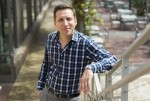Adi Jaffe sat before a group of 20 students Tuesday evening and shared a single text message from his wife that changed his life.
“She said she’d found my Ashley Madison account,” said Jaffe, a psychology professor. “But it was only one iteration of a much deeper problem.”
Jaffe said Ashley Madison is an online service that allows spouses to pursue extramarital affairs. He added his wife’s discovery was one of several events that compelled him to seek help for his sex addiction.
The UCLA Sexperts Committee, a subcommittee of the undergraduate student government’s Student Wellness Commission, held a discussion called the “Sexperts’ Fireside Chat” at the Anderson School of Management on Tuesday evening. Sophie Jaffe, a wellness and fitness expert, and Adi Jaffe spoke at the event about their marriage and the broader impacts of sex addiction on relationships.
Tate Johnson, co-director of the Sexperts Committee, said he created the event with co-director Renata De La Torre to increase open discussion about sex addiction. He said they were inspired after reading Sophie Jaffe’s Women’s Health article, “What It’s Like to Be Married to a Sex Addict.”
“Bruins may not know where to seek help for sex addiction,” Johnson said. “In order to address that, we need to start talking about it.”
He added he thinks the program, organized as a conversational panel rather than a lecture, helped make the topic more approachable for students.
“Our society is pushing towards normalization of mental disparities,” Johnson said. “We need to legitimize sex addiction as the mental health issue it is.”
During the event, the Jaffes spoke about how they worked together to strengthen their relationship.
“Relationships often end when one person finds out they have a problem,” Adi Jaffe said. “It can be easier to just leave than confront the issue.”
He said he wanted to speak at the event because he had not been properly educated about intimacy growing up. He added he thinks society often places emphasis on unhealthy ideas of sexuality.
“I had the wrong concepts of what makes a true relationship,” he said. “I found this out only by repeatedly hurting my wife.”
Jaffe added he also abused drugs in high school and college, and few people understood what he was actually going through.
“Drug addiction has its own layers of shame,” he said. “If you add sex to the mix, it’s even worse. People think it’s an excuse.”
Adi Jaffe gave a TEDx talk at UCLA in July on the impact of labels, stereotypes and shame surrounding mental health.
Sophie Jaffe said she and her husband were able to heal with a blend of couples therapy, meditation and open communication.
“Our relationship is a metaphor,” she said. “We just want to talk about two people trying to build trust again. We had to put in the work every day.”
She added she wishes someone had helped her become more comfortable talking about sex when she was growing up.
“There are many societal pressures on having a perfect sexuality,” Jaffe said. “But it’s all about building patterns and behaviors that help you love yourself.”
Adi Jaffe added students can register to take free programs from Sex Addicts Anonymous or Sex and Love Addicts Anonymous, or visit outpatient centers in the Los Angeles area.
“The first step is asking for help and going to someone you trust,” he said.
Troy Kato, a first-year undeclared student, said he thinks the event will help spark more dialogue on campus about sex addiction and other taboo topics.
“If you open up the discussion, you will encourage people to (address issues),” Kato said. “When you hide things, it just makes the problem worse.”
Johnson said the Sexperts Committee is planning another event for spring quarter about sexual health and gender identity.
“The ‘Fireside Chat’ is over, but we don’t want the conversation to end,” he said.
